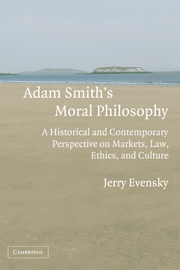 Adam Smith's Moral Philosophy
Adam Smith's Moral Philosophy Book contents
- Frontmatter
- Contents
- Preface
- Adam Smith's Moral Philosophy
- PART ONE ON ADAM SMITH'S MORAL PHILOSOPHICAL VISION
- PART TWO ON THE PLACE OF THE WEALTH OF NATIONS IN ADAM SMITH'S MORAL PHILOSOPHICAL VISION
- PART THREE ON ADAM SMITH'S MORAL PHILOSOPHICAL VISION AND THE MODERN DISCOURSE
- Epilogue: On the Human Prospect
- References
- Index
Epilogue: On the Human Prospect
Published online by Cambridge University Press: 11 November 2009
- Frontmatter
- Contents
- Preface
- Adam Smith's Moral Philosophy
- PART ONE ON ADAM SMITH'S MORAL PHILOSOPHICAL VISION
- PART TWO ON THE PLACE OF THE WEALTH OF NATIONS IN ADAM SMITH'S MORAL PHILOSOPHICAL VISION
- PART THREE ON ADAM SMITH'S MORAL PHILOSOPHICAL VISION AND THE MODERN DISCOURSE
- Epilogue: On the Human Prospect
- References
- Index
Summary
In his Principles of Political Economy, having laid out those principles, John Stuart Mill stops to reflect on the human prospect:
The preceding chapters comprise the general theory of the economical progress of society, in the sense in which those terms are commonly understood; the progress of capital, of population, and of the productive arts. But in contemplating any progressive movement, not in its nature unlimited, the mind is not satisfied with merely tracing the laws of movement; it cannot but ask the further question, to what goal? Towards what ultimate point is society tending by its industrial progress? When the progress ceases, in what condition are we to expect that it will leave mankind?
(Mill, 746)Asserting the “[i]mpossibility of ultimately avoiding” it, Mill says that the human prospect is a “stationary state” (Mill, 746).
He notes that this image has represented “an unpleasing and discouraging prospect” “to the political economists of the last two generations” (Mill, 746) because they have envisioned this end in Malthusian terms as a time when population growth finally outruns production growth. Then comes “doom … an ‘end in shallows and in miseries’” (Mill, 747).
Mill includes among those political economists who have dreaded this prospect, “Adam Smith[, for, according to Mill, Smith] always assumes that the condition of the mass of the people … must be pinched and stinted in a stationary condition of wealth, and can only be satisfactory in a progressive state” (Mill, 747).
- Type
- Chapter
- Information
- Adam Smith's Moral PhilosophyA Historical and Contemporary Perspective on Markets, Law, Ethics, and Culture, pp. 308 - 312Publisher: Cambridge University PressPrint publication year: 2005
